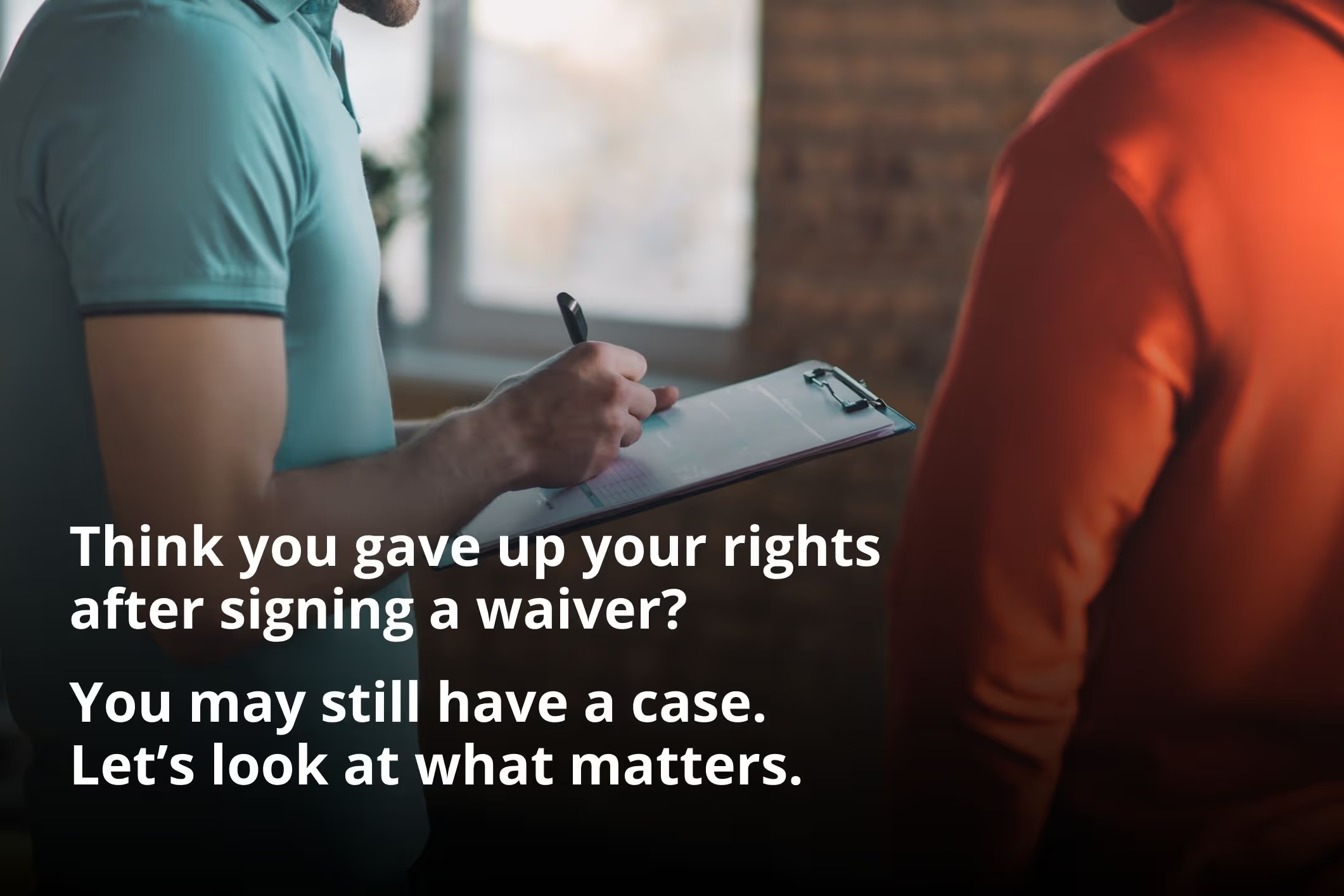You signed a waiver. Then something went wrong. Now you're asking: Can you sue after signing a waiver, or did that form take away your rights to?

Many people assume a waiver shuts the door on any lawsuit. But that's not always true.
A signed form doesn't automatically excuse negligence or unsafe conditions. The details of what happened, how the waiver was written, and whether reasonable precautions were taken can all change the outcome.
Understanding your rights starts with knowing how courts interpret waivers and what they look for when deciding whether an agreement holds up.
Thorsnes Bartolotta McGuire has helped injured clients challenge unfair waivers and hold negligent parties accountable for over four decades. Call us at (619) 236-9363 or fill out our online form to learn how we can help you.
What Does a Liability Waiver Actually Mean?
Liability waivers protect businesses or service providers by limiting their legal responsibility if someone gets injured. You'll see them at gyms, medical offices, sports facilities, and school events—anywhere there's some level of physical risk.
But signing a waiver doesn't mean you're giving up all rights. The law still holds people and companies accountable for unsafe conditions, reckless behavior, or actions that go beyond what a waiver can legally excuse.
So, if you sign a waiver, can you still sue? That usually depends on two things:
- Did the injury happen because of the usual risks of the activity?
- Or did someone fail to take reasonable precautions, leading to something preventable?
Even with a signed waiver, you may still have the right to take legal action, depending on what happened.
Waivers Don't Excuse Negligence or Unsafe Conditions
Signing a waiver does not give a business a free pass to ignore safety. While some level of risk is part of certain activities, companies and service providers still have a legal duty to take reasonable precautions.
Many people ask, do waivers protect against negligence? In most cases, the answer is no.
Negligence happens when that duty is unmet and basic steps are skipped, ignored, or overlooked. This might include:
- Failing to inspect or maintain equipment,
- Ignoring reports of problems or malfunctions,
- Hiring staff without proper qualifications,
- Not supervising activities or providing safety instruction, and
- Violating industry regulations or safety protocols.
Here's the difference:
If you strain a muscle during a workout or slip on a clearly marked wet floor, those are risks you may have willingly accepted by signing a waiver. But if a cable snaps on a poorly maintained machine or a trainer gives unsafe instructions that cause injury, that crosses a legal line.
Even if the waiver seems valid, it is not likely to shield the business from liability when harm could have been easily prevented. Courts recognize that some risks are acceptable. Negligence is not one of them.
If you sign a waiver, can you still sue? An injury caused by negligence may override what you signed. Contact Thorsnes Bartolotta McGuire at (619) 236-9363 or online. We'll help you understand your rights and next steps.
Are Waivers Legally Binding?
They can be, but only if they meet certain legal standards.
Not every waiver will hold up legally. To be enforceable, a liability waiver must meet a few specific requirements:
- It clearly outlines the types of risks involved,
- The person signs it voluntarily and understands what they are agreeing to,
- The incident falls within the scope of what the document covers, and,
- The business or service provider acted responsibly and upheld safety obligations.
The waiver may have no legal effect if those conditions are not met. Vague, overly broad, or difficult to understand language is more likely to be challenged. Waivers also tend to fail when they attempt to cover misconduct or excuse serious failures in judgment.
There are additional limits when it comes to minors. A child cannot sign away their own legal rights. A parent or guardian may sign on their behalf, but even those agreements do not always hold up. Legal protections for children are often stronger, particularly when proper safety procedures are ignored.
Do Waivers Hold Up in Court?
Sometimes. But not always.
Once a waiver is signed, many assume it automatically blocks legal action. In reality, courts look at how the waiver was written and presented, and whether it fairly reflects the situation that led to the injury.
A court may refuse to enforce a waiver if:
- The risks were not clearly explained at the time of signing,
- The waiver was buried in fine print or written in confusing legal language,
- The injury was unrelated to the activity covered by the waiver,
- The business failed to follow basic safety standards, or
- The waiver attempted to excuse unlawful or reckless behavior.
A judge will often consider the full context, including whether the person who signed the waiver understood what they agreed to. If the waiver overreaches, contains vague terms, or tries to release a company from responsibilities it should never avoid, the court may set it aside.
The existence of a waiver does not automatically mean a business is off the hook. Courts look at both the document and the circumstances. If enforcing the waiver would lead to an unfair outcome, it may be ruled invalid.
How to Know If You Have a Case
After an injury, it's common to second-guess yourself, especially if you signed a waiver. But the real question isn't just whether you signed something. It's whether the business did its part to keep you safe.
A study published in Injury Epidemiology found that most people mistakenly believe that waivers eliminate their right to sue, even in cases where negligence is involved. That misunderstanding can stop injured individuals from seeking justice when they actually have a valid legal claim.
If you're wondering, can you sue after signing a waiver, start by asking these questions:
- Were you seriously hurt because of something that felt careless or avoidable?
- Were there safety rules, warnings, or procedures missing?
- Did anyone explain the risks clearly before you signed?
- Did you feel rushed, pressured, or unsure of what you were agreeing to?
- Did staff ignore concerns, complaints, or warning signs?
Experiences like these may indicate negligence or misconduct that overrides what was signed.
An attorney can evaluate the facts and help you understand your options.
Talk With a Team That Understands Waivers
Signing a waiver does not automatically take away your legal rights.
Some waivers are flawed. Some don't apply to the situation. If you were seriously injured due to a business's carelessness, that form may not protect them, and you may have a case.
Thorsnes Bartolotta McGuire has spent over 47 years holding negligent parties accountable, even when a waiver was involved. We know how to examine the details, challenge invalid agreements, and stand up for wrongfully harmed clients.
Call (619) 236-9363 or contact us online for a free case review.






